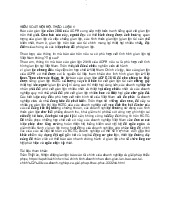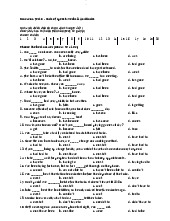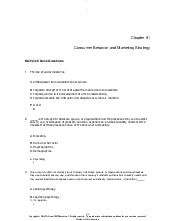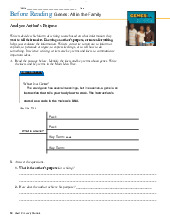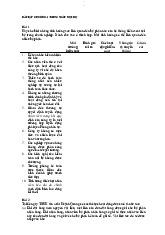

















Preview text:
lOMoARcPSD|472 065 21 lOMoARcPSD|472 065 21
MINISTRY OF EDUCATION AND TRAINING
HO CHI MINH CITY OPEN UNIVERSITY COURSE SYLLABUS I. General information 1.
Course title in Vietnamese: KINH DOANH AND NGHIỆP VỤ (TA) - Course code: ACCO5340 2.
Course title in English: Business and Technology (English) 3. Mode of delivery: ☐ Trực tiếp/FTF ☐Trực tuyến/Online ☒ Kết hợp/Blended 4. Language(s) for instruction: ☐ Tiếng Việt/Vietnamese ☒
Tiếng Anh/English ☐ Cả hai/Both 5. Knowledge/Skills: ☐ General ☐ Major Knowledge ☒ Foundation Knowledge ☐ Supplemental Knowledge ☐ Discipline
☐ Graduation dissertation/thesis 6. Credits Total Theory Practice Self-study 03 03 0 90 7. Administration of the course a) Faculty/Division:
Accounting-Auditing/International Accounting b)
Administrative personnel: Vuong Minh Pham c)
Course syllabus designer: Vuong Minh Pham d) Email: vuong.pm@ou.edu.vn e)
Office: Room 105, 35-37 Ho Hao Hon, District 1, Ho Chi Minh City II. Course overview 1. Course description:
The course introduces knowledge related to the business and operating environment
of the business including its structure and role of accounting as well as the main
functions of the business. In addition, the course also provides knowledge related to
management and business development. 2. Requirements:. No. Requirements Code 1. Pre-requisites N/A 2. Preceding courses N/A 3. Co-courses N/A 1 lOMoARcPSD|472 065 21 3. Course objectives Course Description PLOs objectives
Develop awareness regarding to objectives and the type of PLO4.8 CO
business, different business structures and the role of PLO4.9 corporate governance. PLO6.2 PLO3.1
Determine functions of accounting and auditing in business CO PLO3.13 environments. PLO6.2
Summarise management and leadership theories within PLO4.13 CO3 business. PLO6.2 PLO6.2 PLO8.4
Determining the importance of management in corporate CO4 PLO8.5
behaviour and the issues related to professional ethics. PLO8.6 PLO8.7 PLO7.1 CO5
Have the capacity to work independently. PLO7.2
4. Course learning outcomes (CLOs) Course (CLOs) Description objectives
Recognise the role of corporate governance and corporate social CO1 CLO1 responsibility.
Explain the relationship between accounting and other parts/functions of CO2 CLO2 the business.
Explain the leadership role of managers in activities at the enterprise and CO3 CLO3
the principles that help motivate employees in the enterprise.
Explain conflict resolution techniques in business and key ethical CO4 CLO4 principles in business. CO5 CLO5
Complete given tasks timely and efficiently.
Matrix product between Course learning outcomes (CLO) and Program learning outcomes (PLO) allocated for the course PLO PLO PLO PLO PLO PLO PLO PLO PLO PLO PLO PLO CLOs 3.1 3.13 4.8 4.9 4.13 6.2 7.1 7.2 8.4 8.5 8.6 8.7 CLO1 3 3 3 CLO2 3 3 3 CLO3 3 3 CLO4 3 3 3 3 3 CLO5 3 3 2 lOMoARcPSD|472 065 21 5. Textbooks and materials
[1] BBP Learning Media. ACCA : Business and technology (FBT/BT) : for exams from 1
September 2020 to 31 August 2021: Interactive text. London: BPP Learning Media Ltd, 2020.
[2] BBP Learning Media. ACCA : Business and technology (FBT/BT) : for exams from 1
September 2020 to 31 August 2021: Practice & revision kit. London: BPP Learning Media Ltd, 2020. 6. Course assessments Assessment Assemment Type of assessment CLOs Weight % methods time (1) (2) (3) (4) After chapter CLO1, CLO2, A.1.1 Discussion 1, chapter 3, 5% CLO4, CLO5 and chapter 5 A.1.2 Multiple- After chapter A1. Formative choice type 2, chapter 4, CLO1 CLO5 10% assessment questions and chapter 6 Chapter 3 and CLO2, CLO4, A.1.3 Case study 5% chapter 5 CLO5 Total 20% A.2.1 Multiple- A2. Mid-term choice type After chapter 4 CLO1 CLO3 30% assessment questions Total 30% A.3.1 Multiple- After khi kết A3. End-of-course choice type CLO1 CLO4 50% thúc môn học assessment questions Total 50% Total 100% 3 lOMoARcPSD|472 065 21 7. Teaching schedule Teaching and learning Textboo FTF Online (if any) Student Secti CLO Self-study ks and Content Theory Practice Theory Practice assessme on s material Ho Activit nt Activity Activity Hour Activity Hour Activity Hour Hour s ur y (1) (2) (3) (4) (5) (6) (7) (8) (9) (10) 1 Course CLO Pre-attempt 12, Course 4,5 A.1.1 [1] introduction 1 with Chapter 5 introductio Chapter Chapter 1. Business CLO 1, Chapter 2, n 1 and 2 Organisations, 5 Chapter 3 & [2] stakeholders and and Chapter Theory for Chapter external 4 material Chapter 1 1 and 2 environment [1] and [2] & 1.1 Business & Multiple- organisations and Discussion choice type stakeholders on LMS questions 1.2 Operating after Chapter [BTTN01] environment of 1 business [TL01] 1.3 Macroeconomic factors 1.4 The micro elements 2 Chapter 2. Business CLO Pre-attempt 12, Theory for 4,5 Watch 4,5 A.1.2 [1] structure and 1 with Chapter 5 Chapter 2 video Chapter corporate CLO 5, Chapter 6 & [VD01] 5 governance 5 and Chapter Multiple- [2] 2.1 Business 7 material choice type Chapter structure [1], [2]. questions 5 2.2 Business & [BTTN02] 4 lOMoARcPSD|472 065 21 Teaching and learning Textboo FTF Online (if any) Student Secti CLO Self-study ks and Content Theory Practice Theory Practice assessme on s material Ho Activit nt Activity Activity Hour Activity Hour Activity Hour Hour s ur y Strategy Multiple- 2.3 Corporate choice type Culture questions on 2.4 Corporate LMS Governance [TN01] 2.5 Corporate Social Responsibility 3 Chapter 3. The role CLO Pre-attempt 15 Theory for 4,5 A.1.1 [1] and function of 2 with Chapter Chapter 3 Chapter accounting in CLO 8 material 8 business 5 [1], [2]. [2] 3.1 The purpose of & Chapter the accounting Discussion 8 information on LMS [TL02] 3.2 The nature and scope of accounting 3.3 Financial information inside and outside 4 Chapter 3 CLO Pre-attempt 10 Theory for 4,5 A.1.2 [1] (continued) 2 with Chapter Chapter 3 A.1.3 Chapter 3.4 Internal Control CLO 9&10 (continued) 9, 10 System 5 material [1], & [2] 3.5 External audit [2]. Multiple- Chapter and internal audit choice type 9, 10 3.6 Fraud in questions [BTTN03] business 5 lOMoARcPSD|472 065 21 Teaching and learning Textboo FTF Online (if any) Student Secti CLO Self-study ks and Content Theory Practice Theory Practice assessme on s material Ho Activit nt Activity Activity Hour Activity Hour Activity Hour Hour s ur y 3.7 Detecting and & preventing fraud Case study 3.8 Money [TH01] laundering 5 Chapter 4. CLO Pre-attempt 7,5 Theory for 4,5 Chapter Leadership and 3 with Chapter Chapter 4 11, 12 Management 11, 12 and and 13 4.1 Leadership and 13 material material management staff [1], [2]: [1], [2] 4.2 Recruitment 4.3 Diversification 4.4 Individual, group and team motivation 4.5 Work for individuals and groups 6 Chapter 4 CLO Pre-attempt 12, Theory for 4,5 A.1.2 Chapter (continued) 3 with Chapter 5 Chapter 4 14, 15, 4.6 Training and CLO 14, 15, 16 (continued) 16 and development 5 and 17 & 17 4.7 Activities material [1], Multiple- material evaluation [2]. choice type [1], [2] & questions Multiple- [BTTN04]. choice type questions on LMS 6 lOMoARcPSD|472 065 21 Teaching and learning Textboo FTF Online (if any) Student Secti CLO Self-study ks and Content Theory Practice Theory Practice assessme on s material Ho Activit nt Activity Activity Hour Activity Hour Activity Hour Hour s ur y [TN02] 7 Mid-term exam CLO Pre-attempt 10 Mid-term 4,5 A.1.1 Chapter Chapter 5. 4 with Chapter exam A.1.3 18 Communication and CLO 18 material & A.2.1 material conflict in business 5 [1], [2]. Theory for [1],[2] 5.1 Communication & Chapter 5 in business Discussion & 5.2 The mainstream on LMS Multiple- channels [TL03] choice type questions 5.3 The non- [BTTN05] mainstream channels & 5.4 Communication Case study barriers in business [TH02] 5.5 Conflicts in the business 5.6 Managing conflicts 8 Chapter 6. Ethics in CLO Pre-attempt 10 Theory for 4,5 Watch 4,5 A.1.2 Chapter business and 4 with Chapter Chapter 6 video 19 accounting CLO 19 material & [VD02] material professional ethics 5 [1], [2]. Multiple- [1].[2] 6.1 The core concept & choice type of corporate Multiple- questions governance choice type [BTTN06] 6.2 Responsibilities questions on & of managers LMS Revision 6.3 Ethical [TN03] environment 7 lOMoARcPSD|472 065 21 Teaching and learning Textboo FTF Online (if any) Student Secti CLO Self-study ks and Content Theory Practice Theory Practice assessme on s material Ho Activit nt Activity Activity Hour Activity Hour Activity Hour Hour s ur y Revision Total 90 36 0 9 0 8 lOMoARcPSD|472 065 21 Ghi chú: A.1.1-TL01
Discussion: the differences in business stakeholders’ information need A.1.1-TL02
Discussion: the differences between management accounting, financial
accounting; audit and internal control A.1.1-TL03
Discussion: conflict of interest in the business A.1.2-TN01
Multiple-choice type questions for Chapter 1 and Chapter 2. A.1.2-TN02
Multiple-choice type questions for Chapter 3 and Chapter 4. A.1.2-TN03
Multiple-choice type questions for Chapter 5 and Chapter 6. A.1.3-TH01
Make a comment on the relationship between fraud, audit, accounting and internal control. A.1.3-TH02
Make a comment on why the lack of communication in the business leads to conflict. BTTN01
Multiple-choice type questions Chapter 1 BTTN02
Multiple-choice type questions for Chapter 2 BTTN03
Multiple-choice type questions for Chapter 3 BTTN04
Multiple-choice type questions for Chapter 4 BTTN05
Multiple-choice type questions for Chapter 5 BTTN06
Multiple-choice type questions for Chapter 6 VD01
Watch video number 1 on the LMS of “ Corporate Social Responsibility ”
and attempt compulsory revision questions (NOT FOR GRADING PURPOSE) after the video. VD02
Watch video number 2 on the LMS of “ Ethical principles in accounting” and
attempt compulsory revision questions (NOT FOR GRADING PURPOSE) after the video. lOMoARcPSD|472 065 21 8.
Matrix between CLOs and teaching and learning methods - student assessment Week Sectio Content CLOs
Teaching and learning methods Student assessment n (1) (2) (3) (4) (5) 1
Giới thiệu môn học CLO1 Lecturer: Theory lecturing. Discussion Chapter 1. CLO5 Student: Attend at lecture, ,
attempt with Multiple-choice type questions. 2 Chapter 2. CLO1
Lecturer: Theory lecturing, cung Multiple-choice type CLO5 cấp video bài giảng. questions
Student: Attend at lecture, attempt with Multiple-choice type questions, Watch video. 3 Chapter 3. CLO2 Lecturer: Theory lecturing Discussion CLO5 Student: Attend at lecture 4 Chapter 3. (continued) CLO2
Lecturer: Theory lecturing, Case Multiple-choice type CLO5 study Discussion. questions
Student: Attend at lecture, attempt Case study with Multiple-choice type questions, Discussion. 5 Chapter 4. CLO3 Lecturer: Theory lecturing Student: Attend at lecture 6 Chapter 4. (continued) CLO3 Lecturer: Theory lecturing. Multiple-choice type CLO5
Student: Attend at lecture, attempt questions with Multiple-choice type questions. lOMoARcPSD|472 065 21 Week Sectio Content CLOs
Teaching and learning methods Student assessment n (1) (2) (3) (4) (5) 7 Chapter 5. CLO4
Lecturer: Theory lecturing, Case Discussion CLO5 study, Discussion. Case study
Student: Attend at lecture, attempt Mid-term exam with Multiple-choice type questions, Discussion. Mid-term exam after Chapter 4 8 Chapter 6. CLO4 Lecturer: Theory lecturing, Multiple-choice type Revision CLO5 Revision. questions
Student: Attend at lecture, attempt with Multiple-choice type questions. 11 lOMoARcPSD|472 065 21 9. Course regulations
- Submitting assignments regulations:
o Students are obligated to complete and submit assignments within given timeframe.. - Class regulations:
o Actively participate in-class discussion and complete others given study activities.
o Pre-attempt with required reading material before coming to the class.
o In case of un-attempting all LMS activities, student would have no progress result for the course for. DEAN OF THE FACULTY DESIGNED BY PhD. Thuy Huu Ho MSc. Vuong Minh Pham lOMoARcPSD|472 065 21 Appendix Course assessment
Course: Business and Technology (English) - ACCO5340
a) Assessment format, content and time: Assessment Assessment Content Duration Evaluation format A.1.1 Group [TL01]Discussion: the 30 Rubric 1 Discussion discussion on differences in business mins/each LMS stakeholders’ information activity need [TL02]Discussion: the differences between management accounting, financial accounting; audit and internal control [TL03]Discussion: conflict of interest in the business A.1.2
Multiple-choice Multiple-choice type 30 Đáp án Multiple- type questions questions [TN01], [TN02] mins/each choice type on LMS and [TN03] questions A.1.3 Case Case study in- [TH01] Make a comment 60 Rubric 2 study class or on on the relationship between mins/each LMS fraud, audit, accounting and internal control. [TH02] Make a comment on why the lack of communication in the business leads to conflict. A.2.1 In-class exam Chapter 1 to Chapter 4 90 mins Assessment Multiple- matrix 1 choice type questions A.3.1 Follow Chapter 1 to Chapter 6 90 mins Assessment Multiple- university plan matrix 2 choice type for final exams questions 13 lOMoARcPSD|472 065 21 b) Rubrics RUBRIC 1 Discussion task
Task description: Student completes following discussions on LMS:
[TL01]: Discussion: the differences in business stakeholders’ information need
[TL02]: Discussion: the differences between management accounting, financial accounting; audit and internal control
[TL03]: Discussion: conflict of interest in the business % Poor Weak Average Fair Good Evaluation Criteria < 4 4.0 <5 5 6.4 6.5 7.9 8 10 Comply with the 20 Do not join the Reply to discussions Answer the Answer the Answer the prescribed time % discussion. outside of the discussion within the discussion in the discussion within the limit for discussion specified time frame. specified time frame right time frame on specified time frame and explanation but not on the right the right topic but do and on the right topic topic. not explain. with appropriate explanation. Content 80 The discussion Students answered Students answered Students answered Students answer % does not meet the discussion
questions discussion questions discussion questions discussion questions discussion in the form of in the form of in the form of in the form of requirement. true/false statements, true/false statements, true/false true/false statements, Wrong answer, no with explanations with explanations statements, with with explanations of explanation, no reaching 40-64%. reaching 65-79%. explanations 90% or more. The The answers only evidence to Correct answers, reaching 80-89%. answers are correct, stopped at the right support the with The answers are have good answer but did not answer, copying explanations/evidenc correct, with good explanations and explain / the another student's e at basic level explanation/evidenc evidence, and have evidence was not work. e. factual connections convincing. in the answers. lOMoARcPSD|472 065 21 RUBRIC 3 Case study
Task description: Student completes following cases study on LMS:
[TH01] Make a comment on the relationship between fraud, audit, accounting and internal control. [TH02]
Make a comment on why the lack of communication in the business leads to conflict. % Poor Weak Average Fair Good Evaluation Criteria < 4 4.0 <5 5 6.4 6.5 7.9 8 10 - Presents many - The presentation has - The - Present only a - Present without Adhere to the 20% spelling errors, has no some spelling errors, presentation has few spelling typos, clear submission schedule clear presentation the presentation is few spelling errors, clear structure, fully and presentation structure, does not structured but errors, the structure, not fully fulfill the format follow the prescribed sketchy, not in presentation has fulfill the requirements, in form accordance with the a clear structure, requirements, accordance with the prescribed form but it does not according to the prescribed form - Do not submit meet the prescribed form practice exercises - Late submission of - Submit practical requirements practice exercises - Submit practical exercises and and conform to exercises and comply with the the prescribed comply with the prescribed form. prescribed deadlines at the - Submit deadlines at the request of the practical request of the lecturer. exercises and lecturer. comply with the prescribed deadlines at the request of the 15 lOMoARcPSD|472 065 21 % Poor Weak Average Fair Good Evaluation Criteria < 4 4.0 <5 5 6.4 6.5 7.9 8 10 lecturer. Content 80% The submission does Submissions meet the Submissions Submissions meet Students meet the not meet the requirements of 40- meet the the requirements requirements of requirements given. Do 64%. Make requirements of 80-89%. Make 90% or more. Make not give evaluation appropriate between 65- appropriate appropriate comments for the case assessment comments 79%. Make assessment assessment study / make for the case study, do appropriate comments for the comments for the not present relevant inappropriate evaluation case study, present case study, present theoretical bases, do comments, do not comments for relevant relevant theoretical not provide present relevant the case study, theoretical bases, bases, provide convincing evidence. theoretical bases, do present relevant and provide convincing not give convincing theoretical bases, convincing evidence and have evidence. do not give evidence at the practical convincing basic level. connections. evidence. 16 lOMoARcPSD|472 065 21 Assessment matrix 1 Level Level 1 Level 2 Level 3 Total Knowledg Skill
Knowledg Skill Knowledg Skill CLO e s e s e s CLO1 Number of questions 8 8 16 Marks 2 2 4 marks = 40% CLO2 Number of questions 6 4 2 12 Marks 1,5 1 0,5 3 marks = 30% CLO3 Number of questions 2 6 4 12 Marks 0,5 1 0,5 3 marks = 30% Total Number of 16 18 6 40 questions: 40 Total Marks: 10 4 4,5 1,5 10 40% 45% 15% 100% Assessment matrix 2 Level Level 1 Level 2 Level 3 Total Knowledg Skill
Knowledg Skill Knowledg Skill CLO e s e s e s CLO1 Number of questions 6 6 12 Marks 1,5 1,5 3 marks = 30% CLO2 Number of questions 6 4 2 12 Marks 1,5 1 0,5 3 marks = 30% CLO3 Number of questions 2 4 2 8 Marks 0,5 1 0,5 2 marks = 20% CLO4 Number of questions 2 4 2 8 Marks 0,5 1 0,5 2 marks = 20% Total Number of 16 18 6 40 questions: 40 Total Marks: 10 4 4,5 1,5 10 40% 45% 15% 100%
